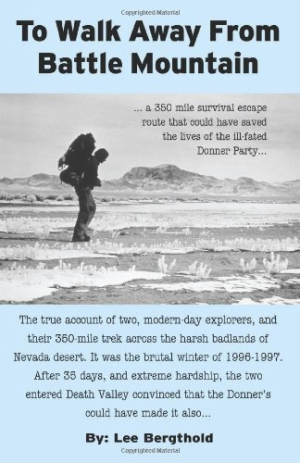To Walk Away From Battle Mountain
Bergthold’s description of the weather, hardships, loneliness, and even boredom of a rough winter trek through Nevada creates a unique portrait of mental toughness.
There are authors who tell tales of adventure and those who take readers along in their rucksacks for every muddy, hungry step. In To Walk Away From Battle Mountain, Lee Bergthold not only describes the challenge of surviving from one moment to the next, he brings the reader into his boredom, anxiety, and wonder with an inner monologue unpolished by time. To take a journey of 350 miles across wild Nevada in the dead of winter is a feat in itself, but this book speaks also of a journey for posterity—to document the human spirit and will to survive. With decades of experience as a wilderness survival expert and photographer, Bergthold brings together rugged techniques and sensitive observations to achieve a nuanced rhapsody of survival.
Bergthold wanted this story to exist even as weeks into his trek he mused, “What the hell am I trying to prove?…What kind of answer can I come up with? Maybe there is no answer, I just do what I do.” With his quiet and courageous partner, Tina Bowers, the author sets out for thirty-five days of isolation, physical hardship, and incredible mental toughness.
“It was akin to standing in the middle of a forest covered with snow, and you’re totally lost; the silence, the eerie twilight, the smells, the cold…a shivering fear that could play havoc with one’s mental being.” Each day is a struggle against weather, loneliness, and starvation. Even the monotony of being held in place for days by snow or rain are revelatory as Bergthold’s writing never lulls. That they are bored, even as they are constantly aware of threats to their survival, demonstrates the pair’s confidence and fortitude. Putting one foot in front of the other in icy mud, against wind and snow, takes determination, but when Bergthold and Bowers are in their tent at night, the quiet battle within themselves begins.
Descriptions of empty boxcars and abandoned buildings where they make camp are surprisingly impactful. One night they camp in an abandoned house amid a field of dead cattle. The macabre scene doesn’t deter them from survival. In one of the few thoughtfully included excerpts from Bowers’s diary, she states, “even sleeping beside ‘death’ would not deprive me of much needed rest.”
A connection to the history of the Donner Party, which is highlighted on the cover, is not central to the story. Bergthold weaves the Donners into his musings and includes them in hand-drawn maps in the appendix, but this historical context for his journey is not really given priority. Anyone looking for a direct connection to history will be disappointed. The photographs are powerful and chosen well to enhance the text, including images of Bower sipping water from a brown puddle and the author hunkered over a small fire amid refuse in an old boxcar.
Surviving “The Great White Nevada Desert” may be nearly impossible, but Bergthold makes writing about it seem easy. To Walk Away From Battle Mountain is both dreamy and nightmarish. The author’s instinct for shaping a story out of countless challenges and bizarre encounters reconciles the two perfectly.
Reviewed by
Sara Budzik
Disclosure: This article is not an endorsement, but a review. The publisher of this book provided free copies of the book and paid a small fee to have their book reviewed by a professional reviewer. Foreword Reviews and Clarion Reviews make no guarantee that the publisher will receive a positive review. Foreword Magazine, Inc. is disclosing this in accordance with the Federal Trade Commission’s 16 CFR, Part 255.

